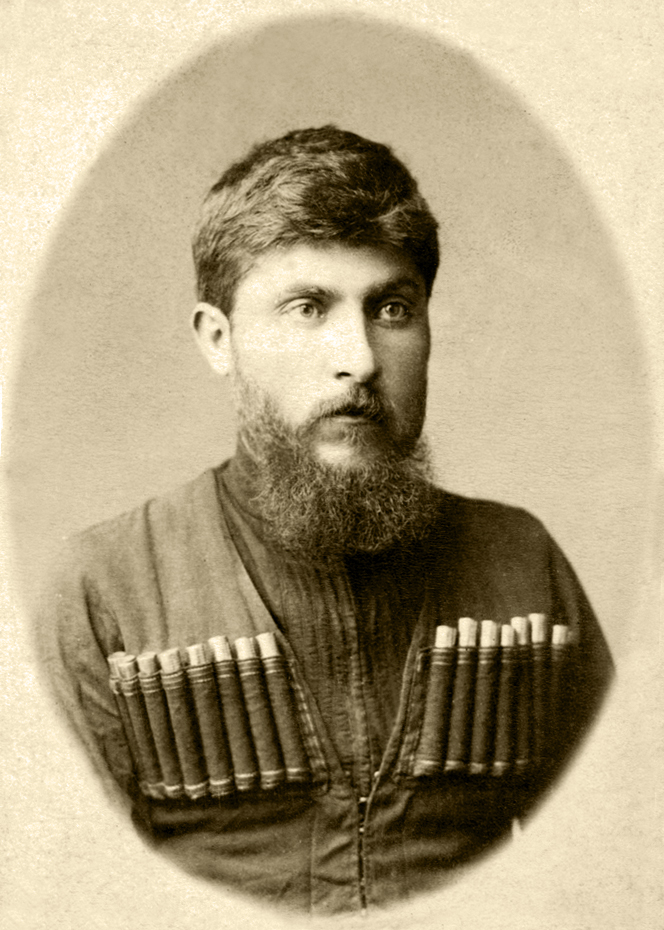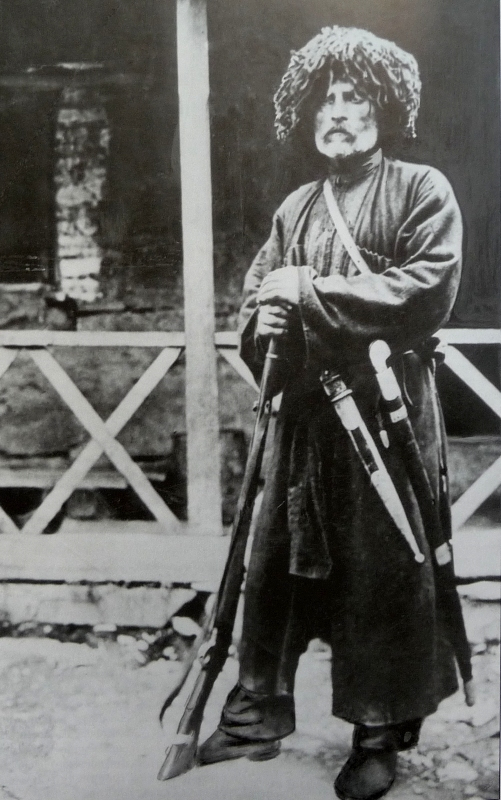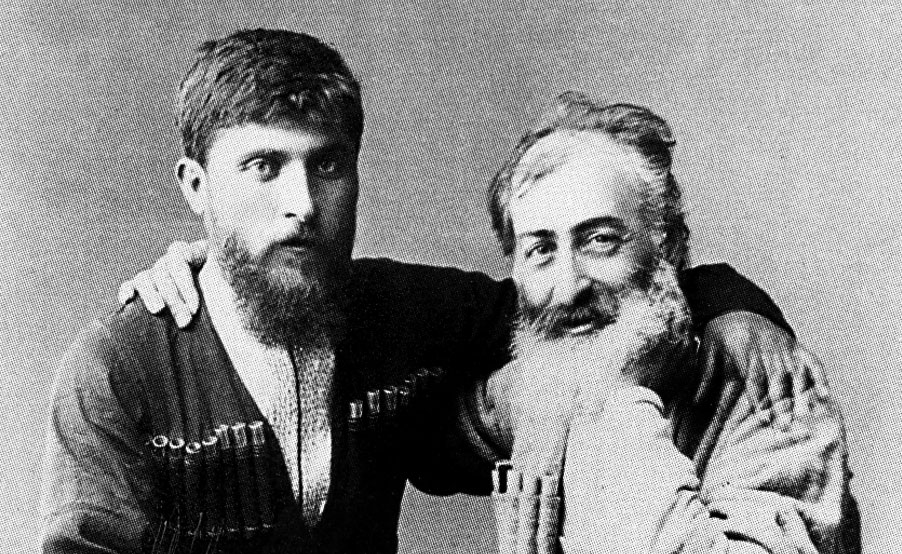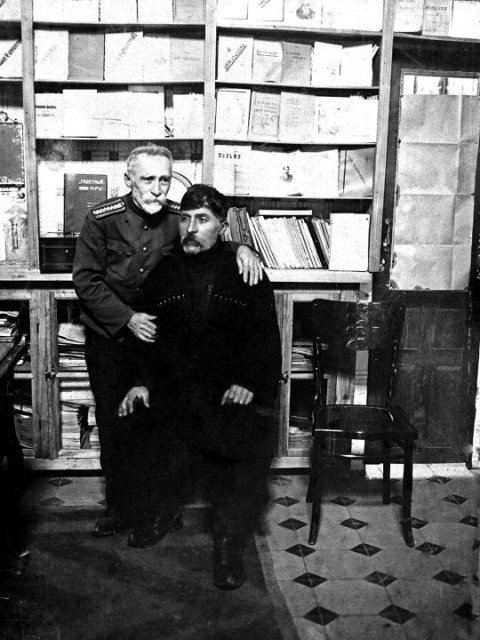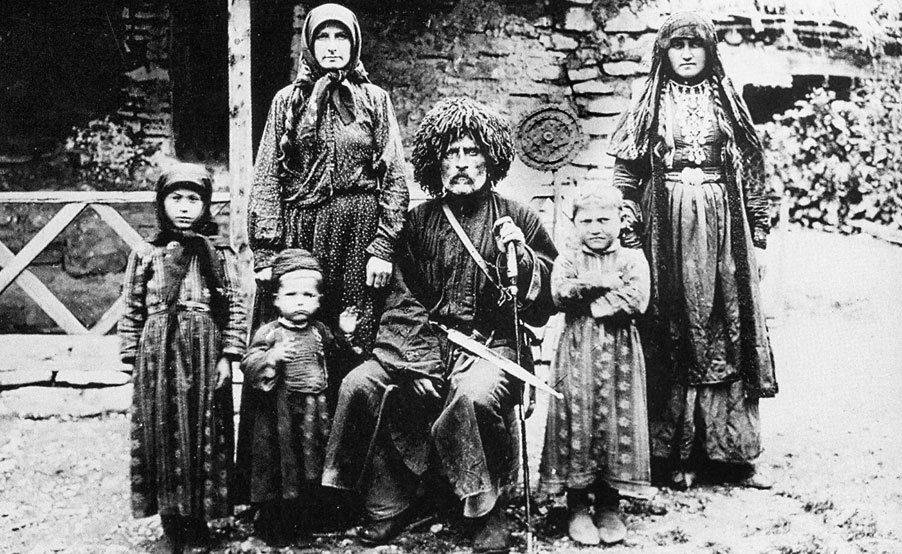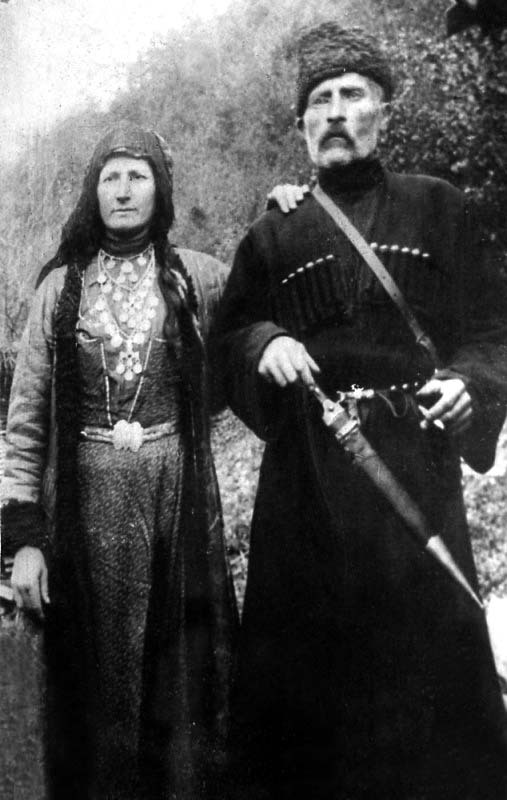| Pour me the wine of liquid flame, And steep my soul in rubied flow; Perhaps twill banish cares away, And tinge with rose this world of woe Perchance 'twill drown the pangs of life In Bacchus' horn of nectared fire, And Fancy find for me a maid Upon whose bosom I'll expire. On whirlwind's wing my steed and I Will cleave the waves of oceans wide. We'll fly the haunts of mortal man Where every joy of mine has died. For death on high is sweeter far Than life upon the earth below Which is an urn of buried hopes, Floating on a sea of woe. |
| Rust adorns thee, sword, and mould'ring Is thy scabbard once so fine. Where's thy master's arm of iron, Where's that flashing gleam of thine?' "On the fatal plain of Shamkor, He fell dead, with many a wound, And his blood flowed like a torrent, Dyeing red the battle ground. Though he fell beneath the struggle With the deadly enemy, Valiant were his deeds and dauntless. Matchless was his bravery Foremost was he in the battle, Smiting, hewing down the foe. Georgia and a soldier's honour Made him bear the crushing blow. A coward's hand has hung me useless Here to rust in endless night. Georgia has become a market Cursed and doomed by venal blight! I, who proudly fought for freedom, Now am pawned or sold for gold, A bartered thing to crown the downfall Of my country's pride of old. Many years have passed since Georgia's Son did whet me till I flashed, Rendered sharp my blade so deadly, And with me to battle dashed. Nor have I heard sounds of trumpets, Nor the shouts of victory... I have passed an age thus hanging Here in rust and slavery." |
| Thy dreams, dear mother, will become A garden full of happiness. O weep not so, nor drown thy heart In languor of grief's heaviness. Our wounds are healed, and once again, We're ready for a dubious fight. The morn we'll greet with battle cries, With deeds of wonder and of might. Tamari's sons will flood the skies With radiance of vict'ry's light, And with our lives we'll guard and keep The torch of honour ever bright. For glory born of fallen pride We ne'er will barter Georgia's right! We'll fell the enemy or die, And ne'er like cowards shirk a fight. Though now we're far from Georgia, yet, Our hearts for her with longing sigh. One thing sends fires through our veins, As wondering we see on high, Above a red-fanged field of war, Upon a flying steed — a knight! He holds a flaming sword that like A star of hope shines in the night! His glowing eyes flash sombre light. And there midst man-wrought hell and woe That knight protects our souls from blight! When all is still and not a sound Is heard of cannon's deafening roar, When battle's surging din is hushed, And thoughts invade my mind once more, I seem to see thee, mother, combing Wool in the quiet of the night. Thy head is bent and tears like torrents Fall on the carded wool so white. A homespun 'chokha' wilt thou sew For me, made holy by thy tear; No sword can tear it, nor can fire Burn through the cloth, O mother dear. And through the long and dreary night Sleep toucheth not thy tearful eyes. God grant to happy smiles and song Be changed thy mournful dirge and sighs. Farewell! the battle-trumpet rings, And bids us rush where soldiers' cries Resound; where blades like lightning blaze And cannon's volley rends the skies. But woe! if glory's thrill is o'er And all our hopes turn to despair! Woe if the spark of valour's flame To ashes cold be quenched fore'er! Perchance the raven black will croak A dirge of doom o'er Georgia fair! Farewell! the battle-trumpet rings And bids us rush where soldiers' cries Resound, where blades like lightning blaze And cannon's volley rends the skies. Farewell! and weep not, for thy son Will fell the foe or bravely die! |
|
|
(An assembled group of Khevsuris are amusing themselves by drinking and singing in honour of warriors whose deeds have made the world wonder. They sing songs of praise to the accompaniment of softly humming panduris. Sitting with them is a pale-faced, grave and dignified figure. Strange tales are told of Mindia's past) For twelve years Mindia was held A captive by the Kajis fierce. Estranged from home, from friends and kin, He spent his dreary days in tears. Thus moments, hours, weeks and months Through tedious seasons led him on, Tied to a rope of misery From blasted hopes and evils spun. Thoughts of his distant native land Like balm flowed o'er his maddened brain. He shut his eyes, and lo! there glowed The land of Khevsuri again. Dim visions of her snow-capped mounts, Her winding paths and murm'ring streams, His parents, kin and cherished friends Invaded all his thoughts and dreams. His lowly hut now seemed to him A paradise beneath the skies... And as he thought and pined for home Sobs burst from him, tears filled his eyes. With time he lost all faith and hope Of ever seeing home again, And longed to find relief in death From all his miseries and pain. ….. Once o'er a blazing fire he saw A cauldron full of serpent's meat. It was the Kajis' choicest dish Which they with relish oft would eat. Now Mindia believed if he Ate of the loathsome meat, 'twould turn To poison in his veins and every Fibre of his body burn. He ate one piece, and sickness smote His every nerve: a chilling sweat Ran down his face, and he could scarce Repress the horror that he felt. But suddenly it seemed to him That from above flowed splendent light And spreading through his veins he felt A surging stream of strange delight. New wisdom pierced his wond'ring brain; He saw the world with different eyes, He saw it smile, he heard it speak, He knew the meaning of its sighs. All things that breathed or lived had tongue, Held converse soft in language strange; And as he learned their secret thoughts He wondered much at all this change. Though Mindia's now sharpened eyes In deepest hell and darkness crept, Though earth and sky and forest, mount, Communed with him or silent wept, No wickedness or evil thought Entered his noble heart or brain. Thus skilled in Kajis' mystic art He strove to banish every pain. All feared his superhuman powers, His God-like strength and piercing eyes. The Kajis fumed and burst with rage To see the mortal rendered wise Inspired, full of life and courage, No more did Mindia despair. He cherished now the hope of breaking The chains of slavery fore'er. ….. Soon Mindia became renowned In Pshav-Khevsuri; and his fame "With time increased, and far and wide Was spread the glory of his name. Th'illustrious Queen Tamari smiled In pride and blessed him from on high And said: "Though strong the enemy, His might will Mindia defy, And naught can crush Pshav-Khevsuri As long as Mindia is alive, For with his powers he'll overcome The foe however hard it strive." He snatched from gaping jaws of death The wounded, sore, nigh cleft in twain, Restored to health the dire diseased, Relieved all suffering and pain. And Pshav-Khevsuri's soldiers brave Stood ever ready for a fight. Thus all praised Mindia the grave, His wisdom and his deeds of might. ….. 'Twas early spring. The world awoke From hoary winter's sleep profound, In fields the flow'rs breathed fragrant balm, The hills with verdure fresh were crowned. The scented buds with bursting smiles Peeped forth through emerald and dew. And Mindia with throbbing heart Roamed mount and vale 'neath heavens blue. He loved to be with trees and flowers, With twitt'ring birds and butterflies; And nature, lovely as a bride, Saluted him with joyous cries. The flowers blushed like virgin maids As each its heart to him unveiled, The trees and grass with rustling swayed, And Mindia with gladness hailed. He saw them tremble as they heard The fondling breezes whisp'ring love, And hearkened to the birds as they Disburdened their full souls above. He knew the longings of their hearts, Their troubles, dreams and all their fears; Their wish to bring relief to man Made Mindia shed happy tears. He learned what root and herb distilled, A soothing balm, for grass and flowers Begged him to pluck them, and thus heal "Wounds by the magic of their powers. The songs of birds were more to him Than melody or sweetest sound; It was the language of their hearts That in his soul a refuge found, Oft Mindia, with axe in hand, Went to the forest for some wood, But as lie raised his axe, a voice Broke through the forest's solitude. In cries that shook the frightened leaves He heard the pleadings of the tree? It brought deep anguish to his heart And made him suffer bitterly. "Thou hast an axe, and strong thou art! Why strike me down and kill me so!" Strength ebbed from him, his slack hand fell, The axe dropped on the ground below. He stood bewildered as the trees All wept and pleaded for their lives. Their tears seemed drops of blood to him, Their sighs cut through his soul like knives. Thus Mindia went slowly home, Unhappy and with troubled heart. He bent before the fireside low And raked the dying embers lest The fire extinguish and expire, Then brought some twigs and heaps of hay To feed the flick'ring feeble fire. He called together all the folk. "The trees feel joy and pain," said he, "Cut them not down! Use only twigs And straw for fire, I beg of ye." In this all thought him queer, for they Said: "God has made all things to be A blessing for the mortal man." None hearkened to him, and the tree Was cut. And to this very day Man fells the tree and thanks the Lord. ….. (It was a holiday, and the Khevsuris were gathered together. They praised Mindia's wonderful powers. But Chalkhia, wished to prove to them that Mindia was an impostor and only pretended to be superhuman. He said that Mindia differed in nothing from them; that the plants and animals were created by God for man's use, and Mindia's talk was all nonsense. Many agreed with Chalkhia. Mindia, who was sitting in their midst, paid no attention to those about him. Tears were in his eyes; no one could understand why. When asked the reason for his tears he pointed to two birds that were perched on the branch of a tree near by. One of the birds, he said, was telling the other of the death of their little nestlings. The mother-bird was weeping. And as the Khevsuris looked up, the bird suddenly dropped down on the ground before them dead with a broken heart. All were astounded, and those who had doubted Mindia's powers now believed in him the more. But nevertheless, they continued to hunt and cut down trees. The enemy invaded the country many times, but thanks to Mindia victory was always on the side of the Khevsuris. In the meantime Mindia had married. He was obliged to hunt and cut down trees in order to feed and keep his wife and children warm. And here began the tragedy of Mindia's life. He felt, as he continued in the ways of man, that lie was gradually losing his wonderful powers. Nature soon spoke to him no more. It was early morning. From Mindia's hut could be heard the voices of Mindia and his wife Mzia. He was blaming her for all the misfortunes of his life, and in bitter words expressed his regret at having married her. Mzia reminded him of how he had wooed and loved her. She tried in vain to make him see that she and her children were not the cause of his suffering. He then confessed that he had lost his magic powers and expressed his fear for the welfare of his country.) The world was wrapt in flimsy veil As from the sky poured sheeted rain; Down mountain sides the waters sped And serpent-like flowed on the plain. The leaves received in patters soft The hissing rainfall from the sky. Each flower beneath the raindrops shone Like Queen Tamari's sparkling eye. The sheep like gems adorned the hills, Sweet-scented was the air and bright; And hearts rejoiced as nature poured Abundant beauty and delight. Fair is the world, yet troubles kill All joy within the human breast. Countless the wretched, but man knows But few, and cannot see the rest. Dark forms of hurrying men were seen, From far resounded shouts and cries: "Where is our leader? Seek him, quick! Find Mindia, the ever wise! The bridge, o'er Arghun is destroyed By the advancing enemy. We must with courage beat them back, From Scythians our country free!" Khevsuris thronged upon the field Made ready for the coming fight. In every breast there burned a flame — Lore for their country's honour bright. Now after many years of peace The foe, athirst for combat new, Had once again besieged the land And Khevsuris in tumult threw. The Pshav-Khevsuris ready stood Awaiting for the morning light. Shields, swords and falchions like a sea Of flashing silver lit the night. Each knew that if the leader of The Scythians were captive made, 'Twould free the country and the world Of one who like a threatening blade Was harbinger of tears and woe. The hero's name in every heart Would like a torch forever glow. Brave women with their children went To towers where they in haste prepared Some food and wine in sheep-skin sacks With anxious hearts and loving care. ….. Twilight its mantle gray spread o'er The valley, field and mountain high, Flow'rs drooped in prayer as evening strewed Her purple shadows from the sky. Aragvi hummed in solitude, The landscape faded from the sight, Loud voices rent the twilight's gloom And broke the stillness of the night. "Pshav-Khevsuris, unsheathe your swords! Crush down th'usurping enemy! Your threatened country needs you now, Fight valiantly for victory!" 'Twas dark. No shepherd's whistling clear Was heard to cheer the gloomy night. Dark forms were seen, and things of worth Were hid away from human sight. The sheep were led to safety, then The folk to shelt'ring forts retired. All wait impatient for the dawn With faces set and hearts afire. ….. On Khakhmat's sacred altar gleamed A candle's quiv'ring feeble light, Its yellow rays embraced the trees, Expiring there in sheer delight. At times the light gleamed brighter still And flung the shadows black aside, Then, like a soul in agony Of death, it flickered low and died. Enough remained of sombre light To see two figures on the plain; One held a blood-stained sword, and on The ground there lay a bullock slain. Berdia "God's blessings on thee, Mindia, Upon thy faith and sacrifice, May He thy ardent prayers receive And hearken to thy endless sighs. Thou art the comfort of our lives, The Pshav-Khevsuris' faith and pride. Heaven and earth extol thy name With hymns that echo far and wide. I wonder much, my Mindia. To see thee here both night and day. What troubles thee, what hast thou done Thus ceaselessly to weep and pray? To God we owe immortal thanks, His praise resounds beyond the skies; May He forgive me, but thy ways Exceed all bounds of sacrifice!" Mindia "A bullock, ox, three cows have I As offerings to our Lord on high; Perhaps He'll hearken to my prayers And heal the wounds that make me cry." Berdia "What wounds, my man, can trouble thee, What pain concealed makes thee despair? Thou hast the power to cure all ills With magic herbs and cordials rare." Mindia "My tongue is tied, no words can ever Express why I thus anguished groan. 'Tis easier to speak of troubles Endured by others than one's own. Does he who gold and silver hoards Open his purse for all to see? O woe! Pshav-Klievsuri is doomed, Condemned by destiny's decree." Berdia ''Thou art our pride, our only hope, The idol of Khevsuri's heart. Thou art the favoured son of God, Schooled in the powers of magic art. When man by illness is oppressed, And sorrow wrings his tortured soul, Thy wisdom banishes his woe, Thy powers restore him, make him whole." (Mindia knelt before the altar and with upraised hands pleaded to God to heed his prayers and bring him back to grace again.) ….. Down poured the rain in hissing sheets, The skies frowned o'er the darkened world, The rumbling sound of loosened rocks Was from the depth of midnight hurled. The thunder pealed, then rumbled on, The high winds howled as if in pain, The grass and flowers drooped low in fright, And shuddered 'neath the trampling rain. On Khakhmat's rock no more was seen The feeble gleam of candle-light. No more did they who weeping prayed Kneel there that awe-inspiring night. The sacred altar stood unmoved As winged fire in the heavens flashed. Below the haughty Aragvi Upon the cliff in fury dashed. ….. (Women were seen in a tower praying for the welfare, of their country and their men. Mindia's wife, Mzia, was also there. She looked troubled. She confided to Sandua (a Khevsuri woman) how Mindia had changed of late. She told her of a dream she had had): "I saw a vision in my sleep So turbulent and full of dread, That ill-forebodings fill my mind And o'er my heart their poison spread. A furious storm raged o'er the land, Black clouds drew down the weeping sky, The lightning leaped from peak to peak, And deaf'ning thunder rolled on high. I almost screamed in fear to hear Such groans of driving wind and rain, To see such bursts of blinding fire, Such tumult wild and hurricane. Confusion swelled; the sky and vale All seemed to mingle in a maze Uniting hell with earth's despair. But suddenly in lightning's blaze The mountain shook and overturned; The shattered trees and rocks were whirled Convulsively into the air, Then into chasms dark were hurled. A fiercer blast the valley shook, Cataracts from the skies descended; Upon the plain, with sullen roar, The waters swelled and upwards tended. A horrid noise was heard above A roar that rent the stifling air, Lamentings wild in dread of death And anguished cries of great despair. Shields, swords and corpses floated on The surging waters of the flood; And none there was to weep and mourn Over the dead with tears of blood. The house from where I saw this hell Stood safe upon a rocky place, But soon the waters curled, and lo! The cliff was shattered at its base And in one mass of wreck was swept Away upon the rushing tide. I screamed in terror as I felt Myself into the waters slide. Thus caught in Satan's frenzied whirl I rent the air with cries for aid; Pressing my children to my breast "With bursting sobs to God I prayed. I tried to clutch the shore, but woe, It spurned my clinging, trembling hand! Then o'er the faces of my babes I flung a veil to hide the land Where features black and blood-shot eyes Of doom-wrought men I saw with fright. Into the wild insurgent stream They pushed me back with all their might. "Tis doom to land upon this shore! God's will be done!' they loudly cried, 'Go swiftly back before 'tis late, And follow thou the rushing tide!' Just then before me I beheld Mindia on the waters fleet. He turned to me and sadly smiled; Then spoke in accents low and sweet: 'Forgive me if I wronged thee with My bitter words, beloved mine. Thou seest the Wheel of Fortune turn, Yet do not weep for me nor pine. Tend well our children, shield them from Life's bitterness and misery.' Ah me! that dream forebodeth ill. Fear makes me writhe in agony." (The Khevsuris were ready for the coming fight. They wished Mindia to lead them and did not believe him when he told them that he had lost his powers. They vowed that without his leadership they would not fight. He yielded. The place he chose for battle gave rise to apprehension and fear, but having sworn they had no way but to obey.) Two days and nights beyond the mount The battle raged in deadly swell. Tigers with lions fiercely strove In gaping jaws of roaring hell. As gleams of steel flew dazzling o'er The struggling mass upon the field, Heart-rending groans and cries were heard Above the clash of lance and shield. Who will to death his glory yield? Who'll breathe his last upon that plain? Who'll find renown and victory there, And freedom for his land regain? Five Khevsuris with faces grim Stole from the field without a sound. They bore a burden o'er the mount And laid it gently on the ground. It was a wounded warrior, A Khevsuri whose bleeding head Was with a kabalakhi bound, And o'er whose face death's pallor spread. The Khevsuris "Why rush into the jaws of death, And like a madman fight in vain? The truly wise and prudent chief Should for his land his life retain; For who can tell, the odds may turn, And we may drive them back again." They turned and rushed beyond the mount With waving swords and hearts aflame, Athirst for triumph o'er the foe With deeds that claim immortal fame. 'Tis agony to yield to death One's vital breath and God-like clay, Yet better feel the pangs of death Than one's own country to betray. Let cowards hide their trembling frames Beneath a woman's dress of shame; But he who braves the foe will live Immortal on the page of fame. Meanwhile Mindia gnashed his teeth As he lay there beneath the skies, For disappointment and despair Burst forth in smothered groans and cries. He struggled long to free his hands From bonds that cut into his flesh. He longed for death upon the field Of battle, not within this mesh. When Mindia unloosed his hands And staggered to his feet again, Fire raged in every wound of his And made him wince with awful pain. A sudden terror froze his blood, He scarce believed his staring eyes, For he beheld the village glow In blazing flames that lit the skies. Aghast was he to see this sight. Cold sweat in drops o'erspread his brow. Hope died within his inmost heart, And crushed he wavered 'neath the blow. His stony eyes were past relief Of soothing 'tears'; cold anguish tied Him to the spot; his fingers still Closed on the dagger at his side; No prayer he dared to murmur as He looked up towards the crimson sky. A sudden flash, — then Mindia Sank down without a word or sigh. He lay upon the soft green grass; As if in slumber he reclined; Blood flowed in streams upon the ground And there the grass with blood was lined. The waning moon in sorrow gazed Upon the lifeless form below. She cast o'er him a silver veil And drooped her head in silent woe. The breeze came blowing down the steep, With silver moonbeams gaily played, Then for a moment stopped to gaze Upon the blood-stained deadly blade. It touched the unsheathed dagger's point, Whirled round the upturned fallen shield, Then flirted gaily with the grass And whistling danced across the field. |
| Vazha-Pshavela (July 26, 1861-July 10, 1915) is the pen-name of the Georgian poet and writer Luka P. Razikashvili, a classic of the new Georgian literature. He was born in a small village Chargali (Pshavi mountainous province in Eastern Georgia) in a family of clergyman. He graduated from the Pedagogical Seminary in Gori 1882, where he became close to Georgian populists (narodniki). Then 1883 entered Law Department of St. Petersburg University (Russia) as a non-credit student, but returned to Georgia in 1884 due to financial restraints. worked as a teacher of Georgian language. He was also a famous representative of a National-Liberation movement of Georgia. Vazha Pshavela started his literature activities in mid-1880s. In his works, he portrayed everyday life and psychology of his contemporary Pshavs. Vazha Pshavela is the author of many world-class literary works - 36 epics, about 400 poems ("Aluda Ketelauri", "Bakhtrioni", "Gogotur and Apshina", "Host and Guest", "Snake eater", "Eteri", "Mindia", etc.), plays, and stories, as well as ethnographic, journalistic, and critic articles. He pictured the highlanders' life almost exactly ethnographically and still recreated an entire world of mythological concepts. In his poetry, the poet addressed the heroic past of his people and appealed to the struggle against external and internal enemies (poems A Wounded Snow Leopard (1890), A Letter of a Pshav Soldier to His Mother (1915), etc.). In his best epic compositions, Vazha Pshavela exposed the problems of interaction between an individual and a society, a human and nature, love and duty before the nation. A conflict between an individual and a temi (community) is depicted in epics Aluda Ketelauri (1888, Russian translation 1939) and Guest and Host (1893, Russian translation 1935); its characters choose against some obsolete laws of their community. The poet's preferences are strong-willed people, their dignity, and zeal for freedom. The same themes are touched in the play The Rejected One (1894). Vazha Pshavela idealized the Pshavs' old rituals, their purity, and non-degeneracy with the "false civilization". The wise man Mindia in the epic Snake-Eater (1901, Russian translation 1934) dies because he cannot reconcile his ideals with the needs of his family and society. The epic Bakhtrioni (1892, Russian translation 1943) narrates on participation of the Georgian highlander tribes in the uprising of Kakheti (East Georgia) against the Iranian subjugators in 1659. As a nature admirer, Vazha Pshavela knows no comparison in Georgian poetry. His landscapes are full of motion and internal conflicts. The language is saturated with all the riches of his native language, and yet this is an impeccably exact literary language. Thanks to excellent translations into Russian (by N. Zabolotsky, V. Derzhavin, B. Pasternak, S. Spassky, and others), Vazha Pshavela's compositions became available to representatives of other nationalities of the ex-USSR. Poems and narrative stories of Vazha-Pshavela have also been translated and published in more than 20 languages. Vazha Pshavela died in Tiflis on July 10, 1915. Buried ibidem, in the Pantheon of the Mtatsminda Mountain. |





